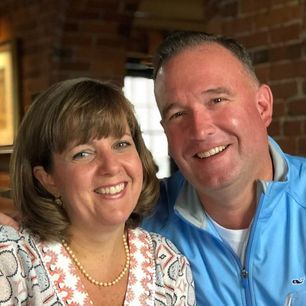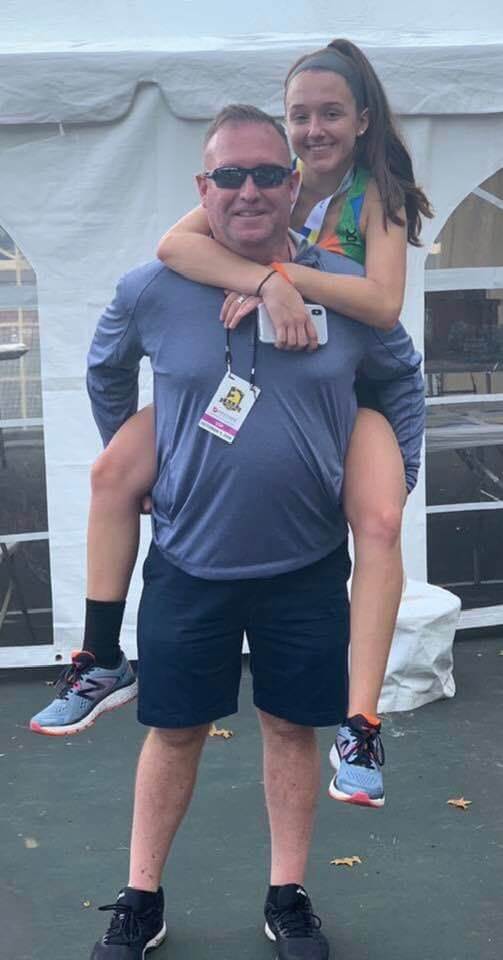Chuck Stravin carries a white three-ring binder to all of his oncology appointments. Inside are his appointment notes, information about his treatment history, and the latest research and advancements regarding his disease.
Nestled alongside these documents also sits a family photo of Stravin, his wife Liz, and their four daughters. Stravin’s family has been instrumental in helping him through treatment at Dana-Farber/Brigham and Women’s Cancer Center, as well as a clinical trial that has put him into remission for the last two years.
“I’m not doing this for me,” explains Stravin. “It’s the six of us that I’m playing for.”

A call you can’t forget
In 2015, Stravin was diagnosed with renal cell carcinoma (RCC), also known as renal cell adenocarcinoma. RCC is a form of kidney cancer that originates in the lining of the small tubes (called tubules) within the kidney.
Leading up to his diagnosis, Stravin recalls feeling fatigued and experiencing lower back pain, but it wasn’t until he found blood in his urine that he became concerned. The development prompted him to reach out to his primary care physician, who immediately ordered a CT scan that would provide her a detailed image of his kidneys. The test revealed a large mass in Stravin’s right kidney, which was later confirmed to be cancerous.
While RCC is typically diagnosed in older adults (the median age is 64), Stravin was only 48 at the time.
“It’s a call you wish you’d never get, and the news that night absolutely leveled me,” recalls Stravin.
The father of four immediately began treatment at Dana-Farber/Brigham and Women’s Cancer Center, where he was placed under the care of Toni Choueiri, MD, director of both the Institute’s Lank Center for Genitourinary Oncology and Kidney Cancer Center.
A clinical trial
In 2018, Stravin was offered the opportunity to participate in a clinical trial called CheckMate – 9ER. The stage III trial was exploring the effectiveness of combining an immunotherapy agent, nivolumab (OPDIVO®), with a tyrosine kinase inhibitor, cabozantinib (CABOMETYX®) in patients with advanced kidney cancer. Clinical trials are scientific studies in which new treatments — drugs, diagnostic procedures, and other therapies — are tested in patients to determine if they are safe and effective.
Nivolumab is a PD-1 checkpoint inhibitor designed to help the body’s immune system recognize and attack cancer cells. Cabozantinib is a tyrosine kinase inhibitor, designed to target the enzymes responsible for cancer cell growth and tumor-induced immunosuppression. Both drugs had received FDA approval on their own, and the trial was testing their combined effectiveness.
Stravin says it was an easy decision to participate.
“Participating in trials like this offers all of us hope — not just for me, but also the next 48-year-old patient with four children,” Stravin says.

Stravin enjoyed clean scans for nearly two years while a participant in the trial. Recently, he transitioned to just taking an oral chemotherapy drug (cabozantinib) after completing two years of immunotherapy, which was the designed length of time for the treatment.
Stravin’s success on the trial was not an isolated incident: the combination proved to increase treatment response rates, and doubled progression-free survival — the length of time in which the disease does not progress — in patients. In January, the U.S. Food and Drug Administration (FDA) approved this combination as a first-line treatment for patients with advanced RCC.
“This pivotal study shows the potential importance among first-line combinations of immunotherapies and tyrosine kinase inhibitors,” said Choueiri. “This drug combination approval means our patients have another therapeutic option.”
Measuring each milestone
A lifelong goal setter, Stravin said the first thing he did following his diagnosis was target upcoming milestones he wanted to experience. He started with hoping to see all four daughters graduate high school. With that now complete, he’s set his goals on four college graduations (two have already graduated), followed by four engagements, four weddings, and ultimately, grandchildren.
“I always like having a target to aim for,” he says with a smile.
Until then, Stravin has been trying to focus on what truly matters, and not let the little things bother him. He’s back working fulltime, which has helped him find a sense of “normalcy,” and he’s enjoying the moments that make each day special. Stravin adds he could not have gotten through this without the love and support he’s received from his family and care team, as well as the strength he’s found in his faith. All of it has given him the motivation to push forward and continue fighting,
“I’m a survivor thanks to the great research that Dana-Farber and others across the country are doing,” explains Stravin. “It gives you hope, and as a patient, hope is really the piece you can hold onto. It’s the most important part for all of us.”

Great success story, great family, great man!!
xo, the McDermott Family
Thank you so much. Because of people like you I have a chance for a longer life. You and your Family are in my thoughts and prayers.
You are a great inspiration. Likely to start a trial myself. Stage 4 Colon cancer. Best of luck and may your future grant all your dreams!